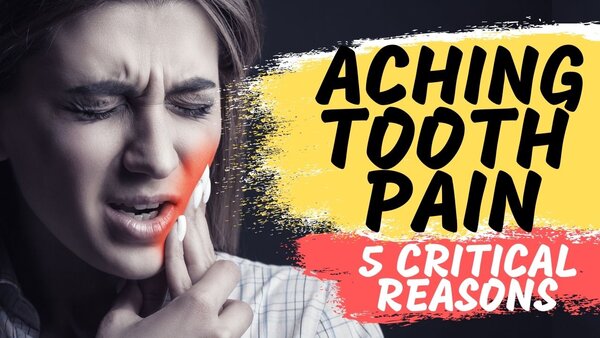
In this toothache guide, I will go over STEP BY STEP all the causes of tooth pain. This informative blog is meant to help you understand what the source of your toothache so that you can get closer to tooth relief.
There are so many websites out there with conflicting information as to why your teeth are hurting & what you can do to feel better; however, these blogs are typically filled with useless remedies that sometimes make your teeth hurt worse.
So I decided to make this informative toothache guide to help give you a dentist perspective.
Lets jump right in . . .
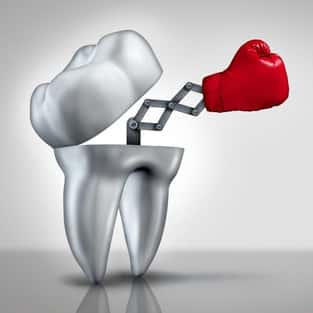
Table of Contents
LARGE CAVITY FOR TOOTH PAIN
What is a Cavity?
So we have to get this out of the way but the number one reason you are probably having a toothache is because you have a large tooth cavity. A cavity is essentially a hole in your tooth caused by acid - producing bacteria that eats away at your tooth.
If a cavity get large enough and approaches the nerve which is in the middle of the tooth then you can have severe pain.
Not all cavities are large and the majority of cavities actually don't cause any type of pain at all.
Dentists discover these cavities by taking radiographs at your periodic examination appointment. In these radiographs we can see dark spots which indicate that the tooth has a lack of density caused by a cavity eating away at the tooth.

Some cavities are only within the outermost layer of your tooth called enamel, some are in the second layer of your tooth called dentin & some have travelled all the way to the nerve which is at the center of the tooth.
Treatment Options for a Cavity?
There are 4 main treatment options for a tooth cavity and it all depends on the size of the lesion. I should also mention that there are very small cavities that we call incipient lesions where we continue to monitor to see if they grow with time.
If they are incredibly small and the patient has a low cavity history then we don't treat these types of lesions
Dental Bonding
If a cavity is small then we remove it with our dental burs and then we can place a small composite resin filling. We use appropriate bonding protocols to make sure the tooth is isolated well and then layer composite incrementally until the cavity is filled with resin. These fillings are incredibly predictable and can last for a long time. For more information about bonding protocol, click here.
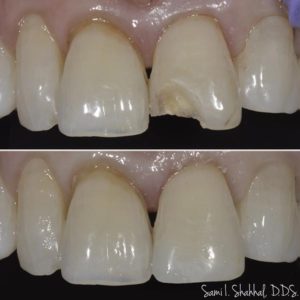
Tooth Crown
If a cavity is large, then we have to use larger tools to remove the entire cavity. Sometimes dentists have to place a liner in the deepest part of the cavity in order to ensure the tooth doesn't need a Root Canal at a later visit. We then build up the tooth with bonding material and proceed with a crown.
Dentists place crowns on teeth if the majority of the tooth is compromised. If a lot of the tooth has been destroyed from a large cavity then bonding a large composite resin restoration on the tooth isn't as predictable.
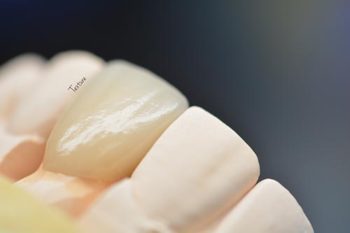
We use measurements to decide which parts of the teeth (cusps) are salvageable which helps us decide which crown we will do. We either decide between a full coverage crown which wraps around the entire tooth or a particle coverage crown which wraps around only part of the tooth.
Crowns come in different materials including PFM, Zirconia, Lithium Disilicate & much more. Dentists decide which crown to use depending on the location of the crown in the mouth as well as the forces of your jaw.
If you have strong bite forces then we need to use a stronger crown. If you have light bite forces then we can use a crown material that is more aesthetic like lithium dislocate. I will make a blog post about this at a later time.
Dental Root Canal
If a cavity extends into the nerve then one option to consider is a dental root canal. A root canal is essentially when you remove the nerve from the middle of the tooth & fill the tooth with a bio compatible material to make sure you're not in pain.
After the root canal is completed we typically place a full coverage crown over the tooth; however this can vary on anterior teeth.
Root canals are meant to be a final resort before extracting a tooth. There can be complications with root canal therapy and we have to remember the tooth is at a much weaker state when the root canal is completed.
However, it can allow you to keep your tooth a bit longer.
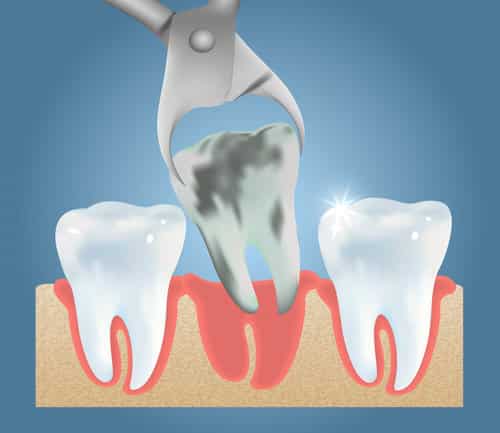
Tooth Extraction
An extraction is the final resort if too much of the tooth has been compromised and we can no longer predictably place a crown on the tooth.
If an extraction is completed there are tooth replacement options like partial denture or better yet dental implants.
Tooth implants are the best way to replace a missing tooth and have predictably been placed in many of my patients.
DOWNLOAD THE PHOTOGRAPHY
QUICK START GUIDE (PDF)
Enter to Win Free Course Material
TOOTH BITE PROBLEMS
Your bite is the second reason why you may be having a toothache.
Ideally, we want an even distribution of forces on both sides of the mouth when you bite and grind your teeth left and right. This is why orthodontic therapy can be so powerful especially for people whose bite if off (underbite/overbite).
Pain on Restoration (Crown or Filling)
Sometimes you can get a new filling / crown & it can be incredibly painful for a few days to a few weeks after you get the restoration completed. After a dentist has completed their treatment, they take the time to adjust your bite so that you are not biting high on the new restoration.
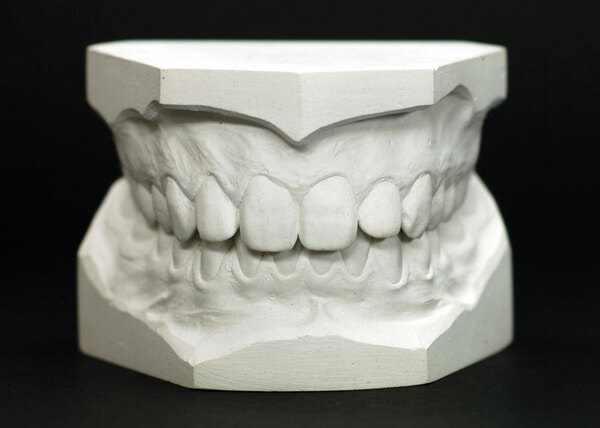
However, you may still be numb from the anesthesia delivered at the beginning of the treatment. Accordingly, we are adjusting the bite when you still haven't regained full sensation of you lips & teeth. So when you go home and regain this sensation then you might notice that you are biting too high on the filling or crown.
Please make sure to call your dentist if you are still experiencing this issue and they will perform a bite adjustment which will make you feel so much better.
Pain on Clenching Teeth
Some people clench or grind their teeth at night which can be destructive if not handled appropriately.
If you grind your teeth this can cause severe jaw pain in the morning because your muscles are being activated for 6+ hours as you sleep throughout the night. This can also cause tooth pain if you have a heavy bite or tooth that is a bit high.
Please consider getting a night guard to protect your teeth from banging into each other at night.
SORE GUMS PAIN
Food under Gums
Sore gums can also cause you to have tooth pain. Some people can eat something and dislodge a piece of the food deep into the gums.
If deep enough, this can cause severe pain which can imitate tooth pain. This typically occurs as spontaneous pain that happens literally over night.
I usually get my patients slightly numb and irrigate the area under the gums to see if we can remove the dislodged piece of food. If we can successfully remove the food particle, my patient will experience relief that night.
Periodontal Disease
If you have periodontal disease where you have extensive bone loss surrounding your teeth, this can also be incredibly painful and imitate tooth pain. The best thing to do at this point is go to your dentist to diagnose how severe the gum disease is.
Treatment options include a routing cleaning, scaling & root planing & pocket reduction surgery.
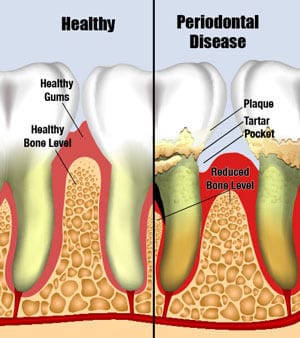
CRACKED TOOTH PAIN
What is a Cracked Tooth?
A cracked tooth can be the most annoying thing to deal with in dentistry for our patients and for the dentist.
Cracks develop on teeth for a variety of reasons. Sometimes, large cracks can develop from heavy masticatory (bite) forces. If you have large silver fillings, these cracks will propagate from where the tooth meets the silver filling.
Some cracks are very small. Others are large and deep.
If a crack is small, it may go unnoticed. You might have no pain associated with the tooth and it won't give you any pain whatsoever.
If a crack is large, it can be painful. You may have pain when eating on that tooth or grinding your teeth at night.
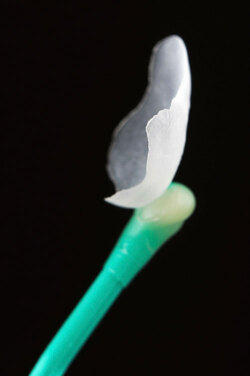
Treatment of Cracked Teeth
Treatment of cracked teeth can be relatively unpredictable.
If a crack is manageable, we remove the crack with our special instruments and then bond a small composite resin filling onto the tooth.
If a crack is too large, we have to see where the extent of the crack ends. if the crack is limited to the enamel, then we can predictable restore the tooth. If the crack extends all the way to the nerve then we might have to perform a root canal. If a crack extends to the floor of the pulp chamber, then we might have to extract the tooth.
If you have a crack, please consider getting it treated immediately before it becomes a problem!
WISDOM TOOTH PAIN
What is Wisdom Tooth Pain?
Not every patient needs their wisdom teeth extraction. If your wisdom teeth come out straight, then you can maintain them for the rest of your life.
In fact, having your wisdom teeth increases your mastication efficiency. However, many wisdom teeth come in sideways. We call the an impacted wisdom tooth.
These impacted wisdom teeth can cause problems and you can have jaw pain associated with those types of teeth.
Treatment for Wisdom Teeth?
Wisdom teeth that cause pain need to be extracted. A surgical extraction involves removing a little bit of the bone and using special tools to section or remove the wisdom teeth. When we remove wisdom teeth, it can be very loud and it can cause a lot of pressure during the procedure.
I recommend having at the minimum N20 (Laughing Gas) when removing wisdom teeth. If you are having all 4 removed at one time then I would recommend being sedated for the procedure.
That's it!
This is all you need to know if you are having a toothache. Be sure to check out my channel Smile Influencers on YouTube for more dental related content. Enjoy your day!
Full disclosure: I receive a commission if you purchase the dental products through my referral links. This helps me run this blog & I appreciate the support.



